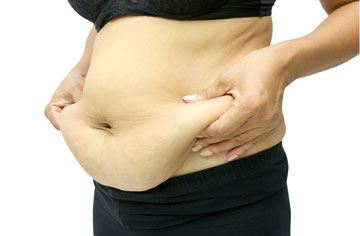 Extra fat around the waist line not only affects your appearance, but it is also dangerous to your health. Visceral fat, as this type of fat is called, is associated with the release of hormones that can cause inflammation that will damage arteries and affect the liver, and influence the way your body breaks down sugars and fats. The only way to get rid of belly fat is by switching to a healthy lifestyle.
Extra fat around the waist line not only affects your appearance, but it is also dangerous to your health. Visceral fat, as this type of fat is called, is associated with the release of hormones that can cause inflammation that will damage arteries and affect the liver, and influence the way your body breaks down sugars and fats. The only way to get rid of belly fat is by switching to a healthy lifestyle.
What is deep belly fat? Fat is stored in our body in two different ways – as subcutaneous fat and visceral fat. Of these two types, subcutaneous fat is easily identifiable because it is stored directly under the skin. Liposuction can address subcutaneous fat. Visceral fat, on the other hand, is stored inside the body, around the organs. Even thin people could have such deeper fat. Such fat is dangerous and can lead to heart disease, dementia, cancer, depression, and many other diseases.
It is not that you should not have any fat between the organs; some visceral fat around your organs is needed to provide a cushioning effect. However, excessive weight gain can lead to the accumulation of too much of fat in the area. That’s when visceral fat becomes dangerous to health. Here are four strategies that can effectively address deep belly fat:
- Exercise: A vigorous exercise regimen can help resolve body fat, including visceral fat. Get at least 30 minutes of moderate exercise for 5 days a week to slow down and prevent the visceral fat from accumulating. Doing regular sessions of strenuous exercise can reduce visceral fat. The most effective exercises to blast belly fat fast are cardio exercises, burst training, weight training, and so on.
- Diet: Include more fiber in your diet. Try to reduce your calorie intake below your daily burn rate and make sure that the calories you do eat come from fresh vegetables, fruits, whole grains and lean proteins, such as white fish, chicken breast, tofu, beans and flank steak. Avoid foods containing fructose (soda, energy and sports drinks and many juice blends, high-fructose corn syrup and table sugar), trans fats (packaged foods, stick margarines, bakery items, fried fast foods, hotdogs, hamburgers, desserts and so on) and refined grains (white flour, rice and pasta).
- Sleep: A study published in Sleep showed that people who averaged 6 to 7 hours a night of sleep had the lowest levels of visceral fat. Good, peaceful sleep resets appetite and stress hormones, boosts metabolism, and keeps cravings away.
- Stress management: Stress has become an inevitable element in today’s lifestyle. Stress leads the hormone called cortisol to release in excess, leading the body to store abdominal fat, which is further aggravated with a high-fat, high-sugar diet. How you manage stress is important to your health. Meditation, prayer, and exercise are good strategies to manage stress. Spend quality time with your family and friends and make sure you stay physically active.